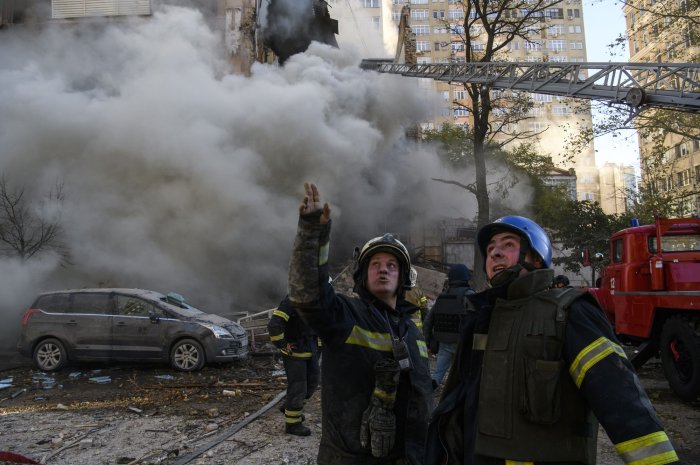Ukrainian President Volodymyr Zelensky attends the ceremony of Ukraine's Defenders Day in Kyiv, Ukraine on Friday. Zelensky promised victory over Russia and freedom for Ukraine. Photo courtesy of Ukrainian President Press Office |
License Photo
The conflict in Ukraine is, by any definition, a "proxy war."
But it is being fought entirely differently by the United States, the West and Russia. The United States and the West are waging a traditional proxy war that Franklin D. Roosevelt used to help Great Britain persevere against Nazi Germany prior to Pearl Harbor and the CIA in Afghanistan after the 1979 Soviet invasion.
Ultimately, the Afghan mujahedin were able to force the Soviets to withdraw using the weaponry supplied by the United States, particularly Stinger missiles.
Ukraine is being supplied with the military wherewithal and support to defend itself against Russia. Whether enough weaponry to eject Russia from all the occupied territories will be provided is unclear. The expectation is that Russian forces will be so badly bloodied that at some stage that war will end to Ukraine's advantage. But expectations are not always met.
Russia is waging a broader "proxy war" against the West, using Ukraine as the "proxy," in essence repeating the U.S. attempt in Vietnam by direct military intervention into Ukraine. In the mid-1960s, Vietnam became a vital American interest in stopping the spread of "Godless, monolithic communism," as Lyndon Johnson argued, on "the Mekong and not the Mississippi." The United States intervened with half a million troops while also trying to build an indigenous army. Both failed.
Russian President Vladimir Putin has not declared war, calling the invasion a "special military operation." Believing that the danger posed by Western engagement in Ukraine is potentially as existential to Russia as LBJ thought Vietnam was to America, Putin concluded that it could only be resolved by military force. Further, Putin has drawn an ambiguous "red line" with the West, threatening to use "all available means."
With the exception of the brief U.S.-Mexican War (1846-48) and, after Pearl Harbor, Japan's occupation of two tiny Aleutian Islands in 1942, unlike Russia, America's external wars after the revolution were all fought offshore. Sept. 11 was next time the United States was seriously attacked at home. For the Russians and Soviets, virtually all wars, proxy or not, were waged on or inside its borders, most recently in Afghanistan and Ukraine.
Proxy wars such as the Spanish Civil War, pitting Nazi Germany against the USSR, have often been enabled by so-called merchants of death. Greek born-Basil Zaharoff was the most notorious. Zaharoff made fortunes selling arms to all sides before, during and after World War I; was granted an honorary knighthood by the crown; and whose life made James Bond seem like a second-rate spy.
Ukraine is no exception. About merchants of death, Russia is supported by and dependent on two: Evgeny Prigozhin and his Wagner Group and Chechen strongman Ramzan Kadyrov. While not a death merchant, in the 21st century digital age, Elon Musk, the world's richest man and owner of SpaceX, controls Ukraine's ability to wage war. Ukraine is entirely dependent on Musk's satellite Starlink for military communications and command and control.
While Zaharoff sold submarines, warships and machine guns, other competitors always existed. This does not apply to Starlink. Suppose Putin persuaded Musk to deny Ukraine Starlink services in exchange for a negotiated end of the war. For the United States, is this a viable and defensible situation when a civilian can control Ukraine's future on the battlefield? And is this a possible violation of the Logan Act, which aims to prevent private citizens from conducting foreign policy?
Which variant of proxy war will prevail? The Afghan case worked 30 years ago. Is it still viable today?
Putin is emulating the Vietnam example. But if this is indeed a wider war being waged against the West, what is Putin's strategy? How far will Putin go given the poor performance of his army and improving that performance may not be possible for the foreseeable future? As LBJ was limited in escalating in Vietnam, will the same constraints affect Putin?
Losing the Vietnam War had no strategic consequences for America. Afghanistan, it can be argued, began the unraveling of the USSR. What geostrategic consequences that success or failure in Ukraine will hold are far from clear. However, dire scenarios are plausible. Given the history of proxy wars, direct military intervention has proven the most costly. Will that repeat for Putin and Russia?
An equally perplexing question is the role of the merchants of death. Prigozhin and Kadyrov are latter-day Zaharoffs. But what influence does each have on Putin? By bringing an entirely new dimension to proxy war yet to be explored, Musk could prove the more problematic and more potentially dangerous.
Harlan Ullman is senior adviser at Washington's Atlantic Council, the prime author of "shock and awe" and author of "The Fifth Horseman and the New MAD: How Massive Attacks of Disruption Became the Looming Existential Danger to a Divided Nation and the World at Large." Follow him @harlankullman.
The views and opinions expressed in this commentary are solely those of the author.
Firefighters conduct work while smoke rises from a building after it was attacked by Russian drones in Kyiv, Ukraine, on October 17, 2022. Photo by Vladyslav Musiienko/UPI |
License Photo
















